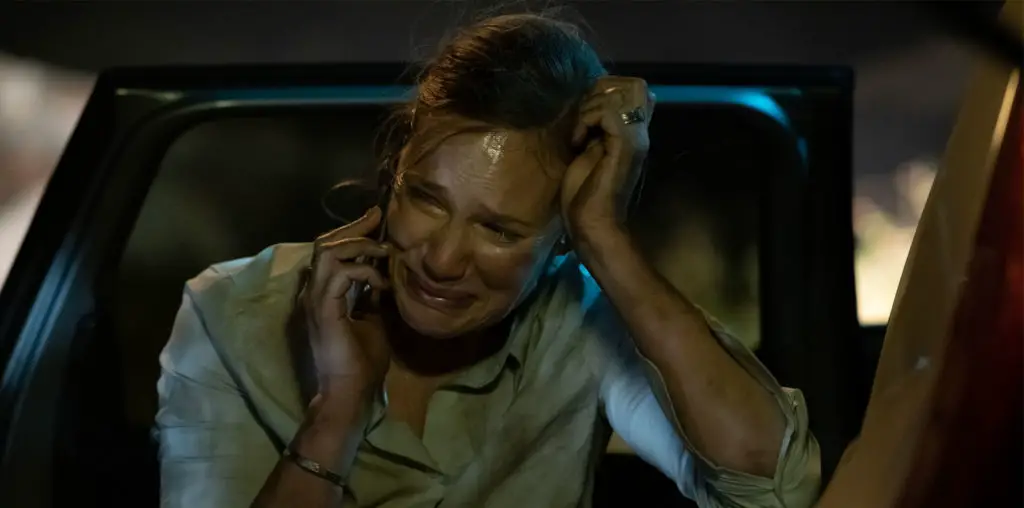
Hany Abu-Asad’s feature “Rana’s Wedding” is among the finest films made in the Middle East. This small, subtle gem offers a vivid portrait of life in the Israeli-occupied Palestinian territories, presenting its message with an intelligence and vibrancy that celebrates the human spirit in an environment where humanity is routinely crushed and assaulted. “Rana’s Wedding,” coupled with the award-winning 2002 comedy “Divine Intervention” by Elia Suleiman, clearly signals the dawn of an exciting new Palestinian cinema that may be the next great center of global filmmaking.
“Rana’s Wedding” focuses on the chaotic single day in the life of a 17-year-old girl who faces an impossible situation. Rana’s father is leaving Arab East Jerusalem for Egypt and he gives her two choices: join him abroad where she can continue her college education or marry a man from the list of eligible bachelors who’ve expressed interest in her. Her deadline is 4pm on the day that her father is due to leave for Egypt. Rana, sneaking out of her family’s home in the wee hours on her deadline day, has her own plan: marry her boyfriend Khalil, a theater director in Ramallah in the occupied West Bank.
But locating Khalil is not easy at Rana hopes. Her calls to his telephone only reach his voice mail. She searches through his known haunts and hangouts in Jerusalem, eventually discovering that he is still in Ramallah. Rana makes her way through the military roadblock that separates Jerusalem from the West Bank, stopping only in a mini-intifada where little boys are throwing stones at Israeli soldiers (after a soldier shoots a boy in the leg, Rana briefly joins in with a lobbed rock at the military occupation brigade). In Ramallah, she located Khalil at his theater and, waking him from his sleep on the stage, announces her plan to marry him that day.
Under Palestinian customs, Rana and Khalil need to find a registrar and all three need to come to her father with the announcement that the couple will be married despite of the father’s wishes. But finding the registrar in the midst of the West Bank chaos and carnage is one problem, and then getting back to Jerusalem before her father’s departure in order to have the wedding that same day is another hassle.
The beauty of “Rana’s Wedding” is the fully dimensional nature of its main character. Rana, as played by the strikingly beautiful Clara Khoury, is hardly the plucky can-do heroine one would normally associate in wedding-related movies (especially of the American variety). She is impulsive, prickly, reckless, and often moody. She openly objects to Khalil’s attempts at singing, claiming she hates the sound of his voice, and her jealousy of the attention paid to Khalil by one of his actresses nearly derails her plans. She is also selfish in a wonderfully powerful manner, whether bullying her way past the Israeli bullies who man the military checkpoints or abruptly announcing her need to visit the hairdresser in the midst of the day’s turmoil, Rana’s focus is strictly Rana and nothing is going to get in her way.
But through Khoury’s deeply nuanced performance and Abu-Asad’s skilled direction, Rana does not come across like a Palestinian princess but rather symbolizes a fully focuses (and very Westernized) young woman who answers to her own agenda. In many ways, she is the first modern heroine of Arab cinema–one who balances the need for stabilizing traditions of Islamic heritage with the contemporary realities of a modern society that demands intellectual and spiritual equality for women.
But Rana needs to fight constantly to achieve what she desires, and “Rana’s Wedding” carefully documents the emotional horror that greets the Palestinian people in their daily existence. From the humiliating checkpoints clogged with people trying to exercise their basic civil rights to free movement to the sweeps of Israeli soldiers harassing people engaged in no criminal activity to the quiet anger brewing in the funeral procession of a young man who was obviously killed by the Israeli military, “Rana’s Wedding” catalogues a nation living under conditions which no civilized people should ever tolerate. Yet the movie never becomes heavily political or reactionary–the endless indignities, human rights violations and humiliations placed on the Palestinian people come without obvious comment from the characters in the film, which in turn makes their conditions all the more harrowing and heartbreaking. There is one exception, however: when a neighbor’s house is being razed by Israeli army tractors, Rana’s sister stoically declares “Don’t worry, we will rebuild it tomorrow.” It is obvious she is not talking about housing, and the barely-veiled meaning in this single sentence literally illustrates the nature of the Palestinian struggle for self-determination.
Filmed in the streets, homes and stores of the Holy Land, “Rana’s Wedding” provides an in-depth and stunning glimpse into the soul of a world that has carried the weight of hatred and violence for too many years. But to its credit, the film never gets lost in anger or revenge. The fact that Rana can push through the limitations around her to achieve the goal of a wedding in white is clearly more powerful than any agitprop diatribe centered on socio-political issues. Rana’s triumph is one of an indefatigable spirit that cannot be broken, delayed or denied by custom or checkpoints. In its quiet but highly focused way, “Rana’s Wedding” speaks volumes about the human condition and ultimately transcends its geography with a universal message that any right-minded person will recognize and cherish. This is an extraordinary film, with a rare blend of art and intellect that challenges without lecturing and emboldens without sloganeering. To be a guest at “Rana’s Wedding” is an honor for any moviegoer with a mind and a conscience.
